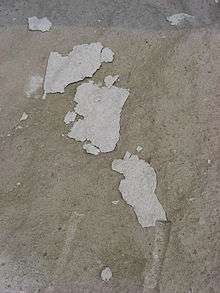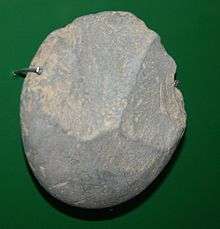Definify.com
Webster 1913 Edition
Flake
Flake
(flāk)
, Noun.
[Cf. Icel.
flaki
, fleki
, Dan. flage
, D. vlaak
.] 1.
A paling; a hurdle.
[prov. Eng.]
2.
A platform of hurdles, or small sticks made fast or interwoven, supported by stanchions, for drying codfish and other things.
You shall also, after they be ripe, neither suffer them to have straw nor fern under them, but lay them either upon some smooth table, boards, or
flakes
of wands, and they will last the longer. English Husbandman.
3.
(Naut.)
A small stage hung over a vessel’s side, for workmen to stand on in calking, etc.
Flake
(flāk)
, Noun.
[Cf. Icel.
flakna
to flake off, split, flagna
to flake off, Sw. flaga
flaw, flake, flake
plate, Dan. flage
snowflake. Cf. Flag
a flat stone.] 1.
A loose filmy mass or a thin chiplike layer of anything; a film; flock; lamina; layer; scale;
“Lottle flakes of scurf.” as, a
. flake
of snow, tallow, or fishAddison.
Great
flakes
of ice encompassing our boat. Evelyn.
2.
A little particle of lighted or incandescent matter, darted from a fire; a flash.
With
flakes
of ruddy fire. Somerville.
3.
(Bot.)
A sort of carnation with only two colors in the flower, the petals having large stripes.
Flake knife
(Archæol.)
, a cutting instrument used by savage tribes, made of a flake or chip of hard stone.
Tylor.
– Flake stand
, the cooling tub or vessel of a still worm.
Knight.
– Flake white
. (Paint.)
(a)
The purest white lead, in the form of flakes or scales.
(b)
The trisnitrate of bismuth.
Ure.
Flake
,Verb.
T.
[
imp. & p. p.
Flaked
; p. pr. & vb. n.
Flaking
.] To form into flakes.
Pope.
Flake
,Verb.
I.
To separate in flakes; to peel or scale off.
Webster 1828 Edition
Flake
FLAKE
,Noun.
1.
A small collection of snow, as it falls from the clouds or from the air; a little bunch or cluster of snowy crystals, such as fall in still moderate weather. This is a flake, lock or flock of snow.2.
A platform of hurdles, or small sticks made fast or interwoven, supported by stanchions, on which cod-fish is dried.3.
A layer or stratum; as a flake of flesh or tallow. Job. 41.
4.
A collection or little particle of fire, or of combustible matter on fire, separated and flying off.5.
Any scaly matter in layers; any mass cleaving off in scales.Little flakes of scurf.
6.
A sort of carnations of two colors only, having large stripes going through the leaves.White-flake, in painting, is lead corroded by means of the pressing of grapes, or a ceruse prepared by the acid of grapes. It is brought from Italy, and of a quality superior to common white lead. It is used in oil and varnished painting, when a clean white is required.
FLAKE
,Verb.
T.
FLAKE
,Verb.
I.
Definition 2026
flake
flake
See also: flakë
English

Flakes (thin layers) on the top of a block of limestone

A flake (prehistoric tool)
Noun
flake (plural flakes)
- A loose filmy mass or a thin chiplike layer of anything
- There were a few flakes of paint on the floor from when we were painting the walls.
- flakes of dandruff
- A scale of a fish or similar animal
- (archaeology) A prehistoric tool chipped out of stone.
- (informal) A person who is impractical, flighty, unreliable, or inconsistent; especially with maintaining a living.
- She makes pleasant conversation, but she's kind of a flake when it comes time for action.
- A carnation with only two colours in the flower, the petals having large stripes.
Derived terms
Translations
thin chiplike layer
|
|
archaeology: thin stone tool
Verb
flake (third-person singular simple present flakes, present participle flaking, simple past and past participle flaked)
- To break or chip off in a flake.
- The paint flaked off after only a year.
- (colloquial) To prove unreliable or impractical; to abandon or desert, to fail to follow through.
- He said he'd come and help, but he flaked.
- (technical) To store an item such as rope in layers
- The line is flaked into the container for easy attachment and deployment.
- (Ireland, slang) to hit (another person).
Derived terms
- flake off
- flake out
Translations
to break or chip
To prove unreliable or impractical; to abandon or desert, to fail to follow through
Etymology 2
A name given to dogfish to improve its marketability as a food, perhaps from etymology 1.
Noun
flake (uncountable)
- (Britain) Dogfish.
- (Australia) The meat of the gummy shark.
- 1999, R. Shotton, Food and Agriculture Organization of the United Nations, Case studies of the management of elasmobranch fisheries, Part 1, page 746,
- Larger shark received about 10%/kg less than those in the 4-6 kg range. Most of the Victorian landed product is wholesaled as carcasses on the Melbourne Fish Market where it is sold to fish and chip shops, the retail sector and through restaurants as ‘flake’.
- 2007, Archie Gerzee, WOW! Tales of a Larrikin Adventurer, page 141,
- The local fish shop sold a bit of flake (shark) but most people were too spoiled to eat shark. The main item on the Kiwi table was still snapper, and there was plenty of them, caught by the Kiwis themselves, so no shortage whatsoever.
- 2007, Lyall Robert Ford, 101 ways to Improve Your Health, page 45,
- Until recently, deep-sea fish were considered to have insignificant levels of mercury but even these now contain higher levels than they used to, so you should also avoid the big fish like tuna, swordfish, and flake (shark) that are highest up the food chain.
- 1999, R. Shotton, Food and Agriculture Organization of the United Nations, Case studies of the management of elasmobranch fisheries, Part 1, page 746,
Etymology 3
Compare Icelandic flaki?, fleki?, Danish flage, Dutch vlaak.
Noun
flake (plural flakes)
- (Britain, dialect) A paling; a hurdle.
- A platform of hurdles, or small sticks made fast or interwoven, supported by stanchions, for drying codfish and other things.
- English Husbandman
- You shall also, after they be ripe, neither suffer them to have straw nor fern under them, but lay them either upon some smooth table, boards, or flakes of wands, and they will last the longer.
- English Husbandman
- (nautical) A small stage hung over a vessel's side, for workmen to stand on while calking, etc.
- (nautical) Alternative form of fake (turn or coil of cable or hawser)
- Frank T. Bullen, The Cruise of the Cachalot: The Story of a New Bedford Whaler
- Flake after flake ran out of the tubs, until we were compelled to hand the end of our line to the second mate to splice his own on to.
- Frank T. Bullen, The Cruise of the Cachalot: The Story of a New Bedford Whaler
References
- flake in Webster’s Revised Unabridged Dictionary, G. & C. Merriam, 1913